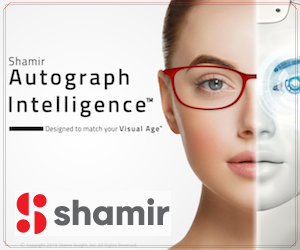
Carrot Lore and More
During World War II, posters told British citizens that eating more carrots would help them “see in a blackout.” Carrots are still associated with vision, but so are a lot other fruits and vegetables.
Tip: To remind them about nutrition and vision, tell kids this joke: How do you know carrots are good for your eyes? Well, have you ever seen a rabbit with glasses?
SPREADING THE NEWS
You know about the importance of eye-healthy foods and supplements, but many patients don’t. One good resource for spreading the word in-office is the AOA’s Nutrition and Eye Health Kit, available in its Marketplace. Make sure children in your practice get the message, too. Here’s one sure way: a nutrition-related vision joke that, whether it makes them giggle or groan, they’re likely to remember.
Q: How do you know carrots are good for your eyes?
A: Well, have you ever seen a rabbit with glasses?
COMBO PLAN
While there’s more than one school of thought about the correlation between blue light exposure in particular and diet, there’s little question that diet can have an impact. Most ECPs agree that the best solutions to minimizing damage from blue light are limiting exposure, visual solutions like Shamir Blue Zero, and a nutrient-dense diet.
BIG 6
Here’s a look at some of the key nutrients in that diet and how they may affect vision.
- VITAMIN C. Shown to lessen the likelihood of cataracts, ascorbic acid, in combination with other nutrients, has been demonstrated to slow the progress of AMD as well as the overall loss of visual acuity.
- VITAMIN E. Found in foods like nuts and sweet potatoes, it helps protect cells of the eye from free radicals.
- LUTEIN + ZEAXANTHIN. Found in eggs and leafy green veggies, they help reduce the risk of AMD and other chronic eye ailments.
- ZINC. Highly concentrated in the retina and choroid, it helps move Vitamin A to the retina. The result? The protective pigment, melanin.
- FATS. Commonly accepted research finds that Omega-3 fatty acids are key to both retinal function and visual development.
- VITAMIN D. Sun exposure helps, but so does diet. Lack of vitamin D is a contributing factor to dry eye. Research is suggesting a correlation to macular degeneration as well. One challenge is that D deficiency may not show up for years.
THE CONTROVERSY
While not everyone agrees on the degree to which any of these nutrients affect vision, most recent research strongly suggests a link between nutrients (in supplements as well as in diet) and eye health. One point of contention, however, is the degree to which they may postpone vs. prevent eye disease.
THE GOLD STANDARD
A growing body of research point to the correlation between nutrition and eye health. The mother of all such studies is The Age-Related Eye Disease Study (AREDS and AREDS2), sponsored by the National Eye Institute. For patient-friendly info about them, go to: https://nei.nih.gov/areds2/PatientFAQ.
How do you communicate the importance of nutrition to eye health? Tell us what you say and share in the Facebook conversation here.
Comments are closed.







